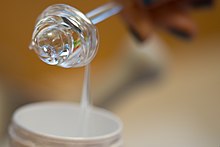Panthenol
Panthenol (also called pantothenol) is the alcohol analog of pantothenic acid (vitamin B5), and is thus a provitamin of B5.
In pharmaceuticals, cosmetics, and personal-care products, panthenol is a moisturizer and humectant, used in ointments, lotions, shampoos, nasal sprays, eye drops, lozenges, and cleaning solutions for contact lenses.
A case study of dexpanthenol application to regenerate bat's dry patagium was reporterd[4].
[2][3] Panthenol readily penetrates into the skin and mucous membranes (including the intestinal mucosa), where it is quickly oxidized to pantothenic acid.
[6] It is also used in the biosynthesis of coenzyme A, which plays a role in a wide range of enzymatic reactions and in cell growth.




